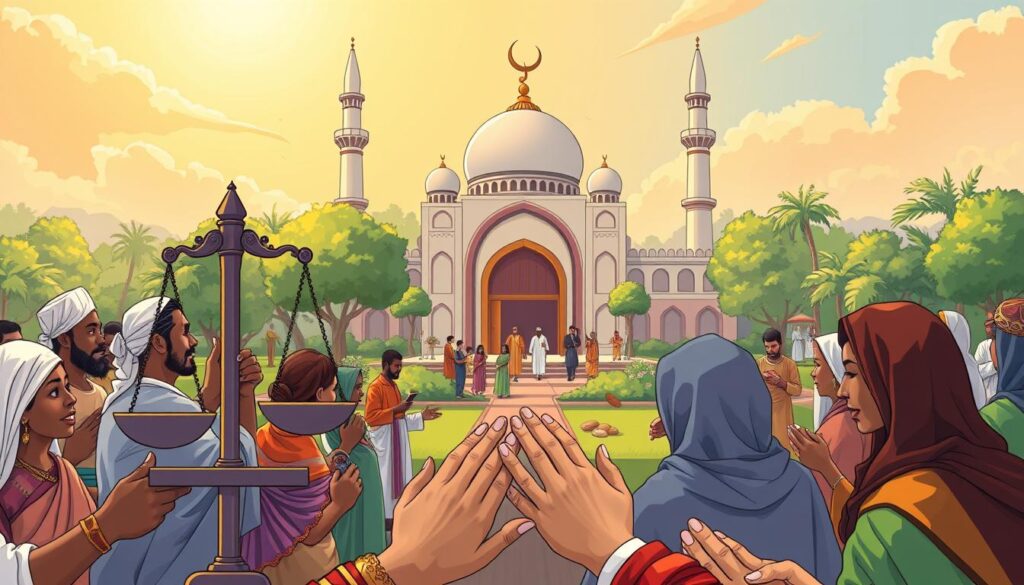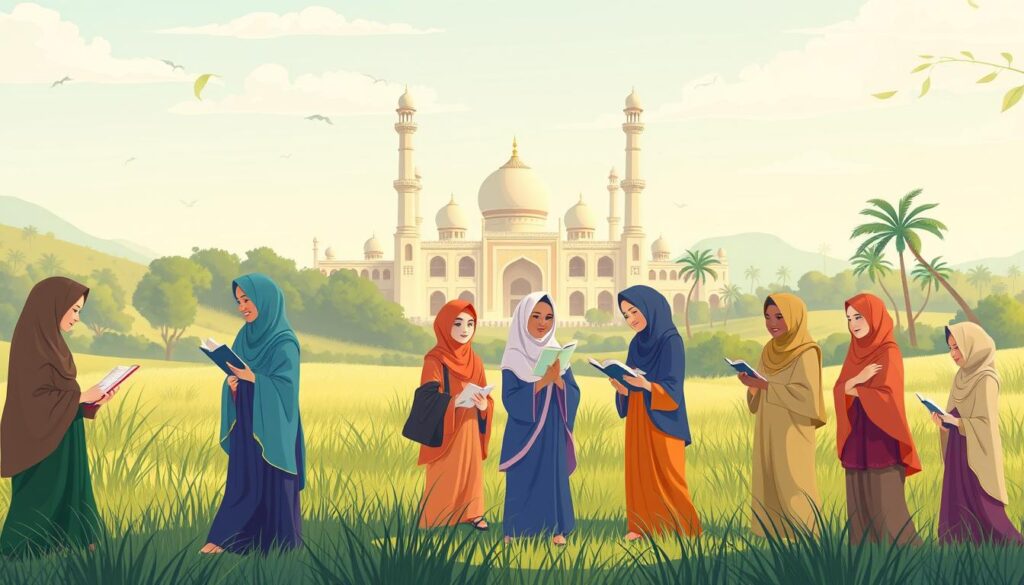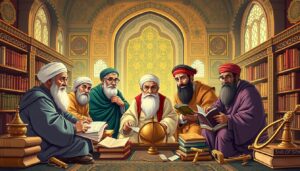Islamic views on social justice are a beacon for creating just societies, deeply anchored in faith. Equality, fairness, and charity are more than just ideals; they are core to Islam’s teachings on justice. The Quran and Prophet Muhammad’s life teach us to honor these values, ensuring everyone’s rights and dignity are respected.
In Islam, justice is crucial, as highlighted in teachings like Ṣaḥīḥ Muslim: no. 2577. It connects to our duty to treat others right. By being compassionate and doing charity, we build a community true to justice and fairness.
The quest for social justice today is as vital as ever. We’re urged to live by Islam’s guiding principles, creating spaces where everyone can flourish. Our charitable deeds reflect our faith’s core values in real life, beyond just fulfilling religious duties.
Key Takeaways
- Islamic views emphasize equality, fairness, and charity as foundational principles of social justice.
- Teachings from the Quran stress the importance of justice in our interactions and community support.
- Engaging in charitable work aligns with our moral responsibilities and strengthens community bonds.
- Social justice in Islam addresses both the needs of the impoverished and the importance of equitable treatment.
- Historical examples illustrate the practical applications of social justice principles among early Muslims.
- Modern society still values these principles, encouraging Muslims to advocate for the marginalized.
- Our commitment to charity not only fulfills religious duties but also cultivates a just and compassionate society.
Understanding Social Justice in Islam
Social justice in Islam is about fairness, equality, and showing kindness to all groups. It stresses the importance of treating everyone with respect and fighting for their rights. It also means making sure everyone has equal chances to access resources. Islamic teachings deeply support the idea of a fair society.
Definition and Importance
Islamic social justice says all people deserve equal respect, no matter their background. It tells us not to judge others based on race, ethnicity, or how wealthy they are. The true value of a person comes from their good actions and faith. This is stated clearly in Quran Surah Al-Hujurat (49:13).
Grasping this helps us respect individuals and brings us closer as a community.
The Role of Quranic Teachings
The Quran often talks about the importance of justice in our lives. It tells us to be fair and make sure no one is treated poorly. For instance, Quran 16:97 says everyone who does good, regardless of gender, will get equal rewards. This underlines that everyone is equal.
Guidance from the Quran also encourages us to be kind and help others. Prophet Muhammad taught that we shouldn’t ignore those struggling around us. Historical examples, like charity in the Ottoman Empire and social programs in Malaysia and Turkey, show social justice in action.
- Enhancing social welfare by implementing zakat, which requires Muslims to contribute a portion of their wealth to support the less fortunate.
- Prioritizing education and healthcare through community initiatives, reflecting the pivotal role of social justice in promoting overall well-being.
- Cultivating an environment where compassion and empathy guide our interactions with both Muslims and non-Muslims alike.
By following these ideas and the Quran’s teachings on social justice, we help create a hopeful and powerful society for everyone. This builds a path toward lasting change and shared success.
Key Principles of Social Justice
In our quest to grasp social justice’s core principles, we turn to Islam’s dedication to building a fair society. Islam teaches us about equality, fairness, and caring for each other. These ideas shape how we act and handle money within our community.
Equality Among All Individuals
Islam considers every person equal before Allah. This truth is rooted in the Quran, promoting equality in Islam as fundamental. It tells us that our value isn’t based on race or background. The idea of treating everyone as brothers underpins social justice, pushing us to act kindly and justly toward others.
Fairness in Economic Transactions
Economic fairness is key to Islam’s view of justice. Islamic trading and business rules focus on honesty and fairness. For example, Islam insists on equal pay for equal work to stop unfair treatment. Research shows that Islamic wage systems ensure fairness, aligning with Islamic principles. Through Zakat, which asks Muslims to give 2.5% of their savings, Islam shows how economic actions can help bridge divides and support those in need.
The Role of Community Welfare
Islam sees community welfare as vital to social well-being. It urges us to look after those who need help, like orphans and the poor. Prophet Muhammad compared believers to a single body, showing our duty to one another. This idea drives us to build a united, supportive community.

| Principle | Description |
|---|---|
| Equality Among Individuals | All people are equal regardless of background, promoting dignity and respect. |
| Economic Fairness | Honesty in trade and equitable wages safeguard against exploitation. |
| Community Welfare | Active support for vulnerable groups illustrates the necessity of mutual aid. |
Islamic Teachings on Charity (Zakat)
In our faith, charity is very important for social justice and community welfare. Zakat is a key form of charity in Islam. It’s a duty for all eligible Muslims. This act helps to clean our wealth and bring our community together.
Obligatory Almsgiving in Islam
Zakat is one of Islam’s main pillars. It shows we care for those less fortunate. Muslims give 2.5% of their extra wealth to fight poverty. This has a set limit, called Nisab, to ensure fairness. The Quran often places Zakat next to prayer. Our teachings on charity in Islam underline that doing Zakat cleans our money and fosters kindness and togetherness.
Benefits of Charitable Acts
Being charitable brings spiritual and social rewards. It helps the needy, creating a strong sense of community. Sadaqah, or voluntary charity, allows us to express kindness in different ways. This could be money, food, or education. The benefits of charitable acts in Islam last over time, like Sadaqah Jariyah, which brings rewards even after we’re gone. Giving also boosts mental health and strengthens community ties, as research shows it reduces stress and improves relationships.
The Concept of Ma’ruf and Munkar
In Islam, Ma’ruf and Munkar teach us to support what’s good and stop what’s bad. These ideas remind us to do good for others and avoid wrong acts. They come from the Quran, stressing the need to act rightly towards everyone.
Promoting Good and Preventing Wrong
These concepts appear often in the Qur’an, urging us to improve community well-being. Doing Ma’ruf means we help with positive things, and avoiding Munkar means we prevent harm. We do this through working with groups and helping those in need, like through the Umar Khan Charity Organization.
Real-World Applications
Ma’ruf and Munkar’s roles are bigger than just our actions; they involve whole communities. By working together, we can make places where good is praised and bad is not welcome. For instance, al-hisbah used to ensure markets behaved morally.
By understanding these ideas, we get better at helping our society be fair. Learning and doing our part helps make a just society. It’s important to tackle today’s problems in ways that fit with Ma’ruf and Munkar.
Historical Figures Promoting Social Justice
Throughout history, many have stood up for social justice in Islam. Prophet Muhammad is a notable figure for his significant and enduring impact on this important part of life. His teachings helped build a foundation for valuing equity, fairness, and supporting the less fortunate in society. In addition, many scholars in Islamic social justice have furthered these ideas, helping us grasp this vital concept better.
Contributions of Prophet Muhammad
Prophet Muhammad, also known as as-sādiq al-amīn, was celebrated for his honesty and reliability before he became a prophet. His strong moral compass guided his stance on social justice. During his Farewell Sermon, he tackled significant issues like women’s rights, the ban on interest, and opposing racism in front of a huge crowd.
- Justice is key in Islam, allowing us to see our actions as just or unjust.
- The Prophet’s teachings motivate Muslims to act justly every day.
- Islam’s worship practices are closely linked with social duty, showing that true faith involves fairness in society.
Influential Islamic Scholars
After the Prophet, scholars like Al-Ghazālī have deepened the debate on these vital values. Their lessons aim to create fair communities. They showed how justice works in real life and helped broaden our understanding of social justice.
| Scholar | Contributions | Key Teachings |
|---|---|---|
| Al-Ghazālī | Stressed the need for justice and kindness every day | For Muslims, doing justice is a main duty |
| Ibn Khaldun | Looked into how society works and justice’s role in leading | Justice keeps society stable and orderly |
Gender Equality in Islamic Teachings
In Islam, gender equality is seen through the Quran’s teachings, which give specific rights and roles to women. These teachings help us understand the place of women’s rights in Islam and their context in history. It’s important to note that recognizing gender differences doesn’t mean inequality; it’s about having different duties that ensure society works well together.
Women’s Rights in the Quran
The Quran has many sections that support women’s rights and honor their dignity. For example, Surah Al-Baqarah (2:229) explains women have rights just like men, showing everyone has basic human rights. Although Surah An-Nisa (4:35) says men are protectors over women, this is about different roles, not about rights being unequal.
- Both genders created from a single soul (Quran 4:1).
- Spiritual equality emphasized despite physical differences (Quran 49:13).
- Recognition of women’s financial rights and property ownership.
- Equal responsibilities before God with acknowledgment of unique roles.
Historical Context of Gender Roles
Looking at history, we see Islam gave women rights they didn’t have before. The roles given often relate to natural differences, like men being providers and women focusing on raising children. While men inherit more, it reflects their duty to provide financially, not their value compared to women.
| Aspect | Men | Women |
|---|---|---|
| Rights | Similar rights as women | Inherit property and retain ownership |
| Responsibilities | Financial provider | Child-rearing and household support |
| Spiritual Rewards | Equal opportunity for paradise (Quran 4:124) | Equally rewarded for righteous deeds |

To sum up, though gender roles are distinct, the Quran guides towards equality. It champions women’s rights and spiritual equality, aiming for a balanced and supportive society.
Poverty and Economic Justice in Islam
Helping those in need is key to fairness in Islam. Islamic teachings stress the need to fix inequality for a stable society. Zakat is a crucial way to lift people out of poverty and empower them economically. By diving into and taking part in Zakat, we can make a big difference, especially in areas that need it most.
Addressing Inequality Through Zakat
Muslims are asked to give 2.5% of their saved money every year through Zakat. This action is not just a religious must-do; it also moves a lot of money towards helping the poor. With 1.9 billion Muslims joining in, the impact is huge. About 70% of Zakat goes to those in need, truly helping those who are struggling. In places with high Zakat participation, poverty can drop a lot, even by 10%.
Economic Empowerment Initiatives
There are many programs aiming to lift people in hard situations. The Umar Khan Charity Organization starts up sustainable programs in education, health care, and jobs. These steps are vital in places where unfair economic rules have made poverty a big issue. Interest-free loans have really helped jumpstart small businesses, with a high payback success rate. Bringing in women, who are often half of the volunteers, strengthens these programs a lot, binding communities closer.
In our quest for fairness in Islam, we see that actions must be based on faith and active work in the community. Working together, we can beat poverty and create true fairness. The involvement of both people and groups in these efforts is a light of hope, giving power to those in need and making society fair for everyone.
The Role of Social Justice in Islamic Governance
Learning about just leadership in Islam is key to creating effective Islamic governance. Leaders must put the well-being of their people first. They should focus on fairness in all their decisions. This approach helps us understand the role of social justice in early Islamic leadership.
Principles of Just Leadership
Islam’s idea of just leadership is built on important principles, including:
- Fairness: All citizens should be treated the same, no matter their status.
- Accountability: Leaders must answer to the people for their choices and actions.
- Compassion: Laws should show kindness to the needy and consider everyone’s needs.
Islamic governance, by following these rules, can create a place where fairness and justice shine. This is especially important when looking after the different needs in a community.
Examples from Islamic History
In history, Islamic governance showed us how to build a society that includes everyone. Caliph Umar ibn Al-Khattab, for instance, introduced many fair policies. These policies were designed to make sure everyone was treated justly.
- He started a support system for the poor and needy.
- He made rules to stop unfair business practices.
- He worked to protect women’s rights and dignity.
These efforts show how Islamic values can improve governance. They serve as examples for today’s leaders to tackle economic challenges and bring people together. For a deeper look, check out this analysis of economic and social justice in Islam.

Modern Challenges to Social Justice in Islam
In today’s world, we face big challenges to social justice in Islam. These problems often come from wrongly interpreting Islamic teachings. This causes conflicts with the main ideas of equality, fairness, and kindness in our faith. It’s very important for us as a community to tackle these issues together.
Cultural Misinterpretations
Wrong cultural interpretations of Islamic teachings can cause wrong beliefs about important values. For example, gender discrimination is sometimes practiced due to local traditions, not because of the Quran or Hadith. This misunderstanding can stop people from seeing the true meaning of social justice. Social justice teaches us to respect and protect everyone’s dignity and rights.
Addressing Contemporary Issues
Today’s social problems, like poverty and people moving from their homes, show why we need to understand social justice in Islam better. The story of Hijrah, where Prophet Muhammad and his followers left their homes to escape being treated badly, teaches us we should help those who are fleeing trouble or suffering. Working on these issues helps us build a fairer society that follows Islamic teachings.
The Future of Islamic Social Justice
The future of social justice in Islam looks promising with the role of interfaith dialogues. These partnerships help us tackle big problems like poverty. Together, we can find new solutions and build a fair world for everyone.
Interfaith Dialogues and Cooperation
Working together across different faiths helps us understand each other better. We share Islam’s key values of kindness and duty. These efforts show we are all connected, pushing for a fair world.
Vision for a Just Society
We dream of a world that follows Islamic justice. Islam teaches us to create places where everyone can succeed. By working together, we can make a future that’s fair for everyone.






